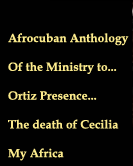




|
EDITORIAL AfroCuba Anthology, Journal 01 -Winter of 2000. AfroCuba Anthology, Journal 01 -Winter of 2000. We all are children from Africa. A lot before 1959 unyielding knots of love and hate had settled down already between Cuba and the United States of America. Now that the ship " Friendship " arrives with its load to the cinema of Hollywood, let us remember when Melvin J. Herskovits in 1930 published its work The Black in the New World in the magazine American Antropologist, proposing the coordinated study of the black cultures in Africa and in the America. The migrations of practitioners of the Afro-Cuban religiosity to North America are increased from the victory of the Cuban Revolution, as well as in the Island it is increased I never eat before the representation of the African ritual arts. The editors and the writers that gather their work in AfroCuban Anthology first edition for the virtual space, don't make but that to exercise the necessary collaboration stops to studies in Cuba and the United States of America the presence of our African roots. This gives light about the importance of analyzing the culture and the Afro-Cuban religiosity when we interpret the African diáspora in North America with a global vision. This first notebook is built in the internet with the participation of studious in Cuba and North America; he/she wants to be a forum where it is shown and not only demonstrate the sincretysm of the African and the European culture, but also cultural panoramas of present time like those that it explores the section The Culture of the Emotions." The articles will either be published in the language that they were written, Spanish, English or Yoruba. In Matanzas we find the biggest variety of ethnoses and African national roots in the America. In Matanzas Olokum, the sea that baptized the city is seated when the aboriginal ones killed a group of shipwrecks in 1510. Matanzas: Oshún in the Marina that the sweet water of the springs sprouts among the stones of the streets and he/she appears in the patios. For that reason we write from Matanzas taking a reference point that it embraces all the Cuban one. Our vision of AfroCuba is inclusive and it doesn't
exclude the European neither the Asian culture that
it forms us. Our objective has been to study the animist
vitality and Afro-Cuban antropomórfic to understand
this culture and religion like resistance shop for
the enslaved worker. AfroCuba is an ideology of survival
that is manifested with international dimension. Meferefun
gbogbo orisha.
|






